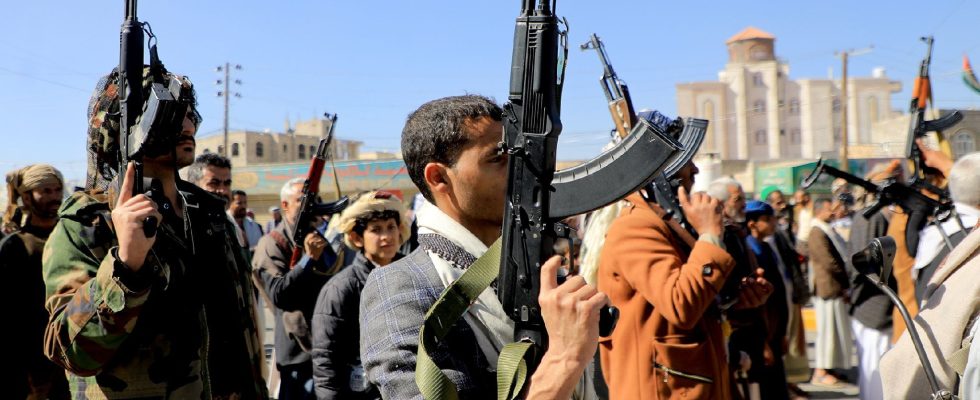The Israeli army intensely bombs the south of the Gaza Strip on Friday against the backdrop of a major dispute between Israel and Washington over a possible Palestinian state and a growing regionalization of the conflict off the coast of Yemen.
Information to remember
⇒ Airstrikes in southern Gaza
⇒ Houthi strikes against an American ship
⇒ Washington calls on Iran and Pakistan to exercise restraint
Strikes on southern Gaza
In the early hours of Friday, January 19, witnesses reported shootings and airstrikes in Khan Younes, the main town in the south of the Gaza Strip where, according to Israel, many members of the local leadership of the Palestinian Islamist movement Hamas are hiding. The Palestinian Red Crescent deplored “intense” artillery fire “in the vicinity” of the local al-Amal hospital, with the Palestinian Wafa agency reporting numerous deaths and injuries overnight in Khan Younes, the epicenter. now there are fights.
Soldiers supported by artillery and aircraft eliminated dozens of terrorists (in hand-to-hand combat) in Khan Younes, the Israeli army said, claiming to have reached the “southernmost” sector of Gaza since the start of its ground deployment which began in the far north of the Palestinian territory.
United States and Israel once again display their differences
The United States and Israel once again publicly displayed their deep differences of opinion on the post-war period in the Gaza Strip, and the prospect of a Palestinian state, the sole guarantor according to Washington of Israel’s security in long term. “We obviously see things differently,” said National Security Council spokesperson John Kirby, when asked about comments by Israeli Prime Minister Benjamin Netanyahu that seemed to reject American requests.
“Israel must have security control over the entire territory west of the Jordan River. This is a necessary condition, which contradicts the idea of (Palestinian) sovereignty,” he said. Benjamin Netanyahu, specifying that he had said this directly to the Americans.
Houthi strikes against an American ship
Yemeni Houthi rebels claimed responsibility early Friday for strikes against an American merchant ship traveling in the Gulf of Aden, a new attack by this pro-Iran group which, however, did not cause any damage according to Washington.
“The naval forces of the Yemeni armed forces (the name given to the armed wing of the Houthis, editor’s note) carried out a targeted operation against an American ship, the Chem Ranger, in the Gulf of Aden with several anti-ship missiles, some of which hit their target,” they said in a statement.
“Safe passage” in the Red Sea for ships from Russia and China
The Yemeni Houthi rebels, whose attacks are hampering maritime traffic in the Red Sea, guarantee “secure passage” to Chinese and Russian ships on this strategic route, one of their leaders told the Russian daily Izvestia on Friday.
Since mid-November, the Houthis have carried out around thirty attacks in the Red Sea and the Gulf of Aden, claiming to target ships heading towards Israel in “solidarity” with the Palestinians in the Gaza Strip. The United States, Israel’s key ally, has set up a coalition to patrol off the coast of Yemen and protect international maritime traffic.
Iran-Pakistan: Washington wants to avoid escalation
The United States declared Thursday that it did not want “escalation in South and Central Asia”, calling on Iran and Pakistan to “restraint” after reciprocal strikes between the two countries in recent days. American President Joe Biden estimated that the abrupt increase in tensions demonstrated that Iran, the bête noire of the United States, was “not appreciated” in the region. “I don’t know where this is going to lead,” added the American president.
The American executive is “following very closely” the tensions between the two countries which have suddenly worsened this week, according to John Kirby, spokesperson for the National Security Council. “These are two well-armed countries and, once again, we don’t want to see an escalation,” he told reporters accompanying the US president aboard Air Force One.
